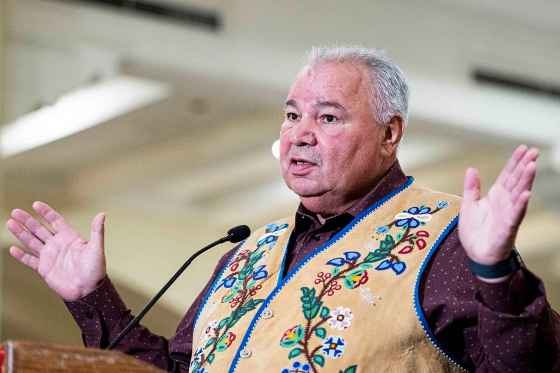FIVE STORIES ON TURTLE ISLAND
1. All eyes were on President David Chartrand and the Manitoba Métis Federation last week, as they boycotted Canadian Prime Minister Mark Carney’s series of “summits” with Indigenous rights holders to discuss the impacts of the passed Bill C5.
This is not simply a squabble between different groups claiming to represent Métis people. My colleague Jennifer Laewetz and I talked about the issue on the APTN National News Truth and Politics panel. This conflict is about who gets to claim rights on behalf of Métis and who gets to decide who is at the table to discuss these rights.
Getting back to the summit, this uncertainty created a weird atmosphere where Carney met with some leaders, phoned some, and didn’t speak to others.
To put it simply, Carney’s “summits” with Indigenous leadership over Bill C-5 have been disastrous, with only the northern meeting with Inuit (when the Prime Minister travelled to Indigenous communities instead of expecting people to come to him — hint, hint) having gone smoothly. Don’t just take my word for it, though, check out this piece in The Walrus by my colleague Joy Spearchief-Morris.
2. In an interesting move this week, the Saskatchewan-based First Nations Bank of Canada announced an equity increase of $50 million in anticipation of more First Nations businesses seeking loans as they create businesses related to Carney’s Bill C-5.
Experts have long called for Indigenous entrepreneurs to be at the centre of Canada’s future economy, and it appears to happening, as the Business Development Bank of Canada predicts Indigenous firms will constitute 23 per cent of all new business development across the country.
During the last federal election campaign (and now implemented), Carney promised to double the amount of federal loan guarantees Indigenous groups and business consortiums could apply for to $10 billion.
3. The first Manitoba database of missing Indigenous men and boys has been published by my CBC Manitoba colleague and friend Alaya McIvor, a longtime advocate on this issue.
According to Statistics Canada, Indigenous men and boys and two-spirit peoples are seven times more likely to be murdered than their non-Indigenous counterparts — a fact Indigenous advocates have been speaking about for some time.
The issue of MMIMB is somewhat well-known and documented but occupies an uncertain place in law enforcement and media circles as many cases are misunderstood, not taken seriously, or simply ignored.
Good job to Alaya on this work. Read more from her “First Person” series about this story.
4. There’s a northern conflict every Manitoban should be aware of as the chief and council of York Factory First Nation battle with Manitoba government officials over the release of dammed water into Split Lake.
In 1957, the federal government forcibly removed the community of York Factory from their traditional homelands to York Landing after the local Hudson Bay Company depot closed.
This meant the community had to use a ferry to connect themselves with nearby Tataskweyak Cree Nation.
Due to this year’s dry climate, water levels have dropped, resulting in the closure of the ferry in July and a state of emergency being declared.
Instead of releasing nearby dammed water, Manitoba Hydro has said they need to save that water if the drought continues and has elected to operate three boats to transport people and goods to the community until an ice road is possible later this year.
Essentially, this means comfort in the south is more a priority than people’s lives in the north — an all-too frequent story in Manitoba.
5. The International Day of the World’s Indigenous Peoples was observed Aug. 9.
Intended to raise awareness and promote the protection of the rights of Indigenous peoples worldwide, the day honours the rich cultures, achievements and contributions of world’s Indigenous communities, while also drawing attention to the ongoing challenges Indigenous communities face — including poverty, discrimination and limited access to education, health care and other essential services.
According to the United Nations, there are an estimated 476 million Indigenous Peoples across the globe, living in more than 90 countries.
Though they make up less than six per cent of the world’s population, they represent at least 15 per cent of the world’s poorest.
Indigenous communities, meanwhile, contribute more than their share to world culture and speak the vast majority of the world’s 7,000 languages and carry forward more than 5,000 cultures — each rooted deeply in tradition, place and identity.
IN PICTURES

Manitoba Metis Federation president David Chartrand speaks during a press conference ahead of the planned Bill C-5 Summit in Ottawa, on Wednesday, Aug. 6, 2025. (Spencer Colby/The Canadian Press files)
RECONCILI-ACTION OF THE WEEK
Every week I highlight an action, moment, or milestone forwarding reconciliation, illustrating how far Canada has come — and how far the country has yet to go.
This week’s reconciliaction is the much-anticipated release of David Driedger’s book Nothing Will Save Us: A Theology of Immeasurable Life.
A minister at First Mennonite Church in Winnipeg and a public theologian, Driedger focuses on homelessness, sex work and a basic income guarantee as a corrective to the dead-end fundamentalism of much Christian doctrine, arguing for a more Biblical- and Jesus Christ-centred way to view people and issues as more than “nothing.”
This is a message I have shared with Christian — and Mennonite audiences in particular — for a long time.
It’s also something I have argued was a message shared during Pope Francis’s 2022 visit to Canada.
Driedger is a local Christian leader worth listening to and reading, and a person I gain a lot of hope for reconciliation from. My Free Press colleague John Longhurst wrote a great review of Nothing Will Save Us in his faith column this week. Check it out.
|

